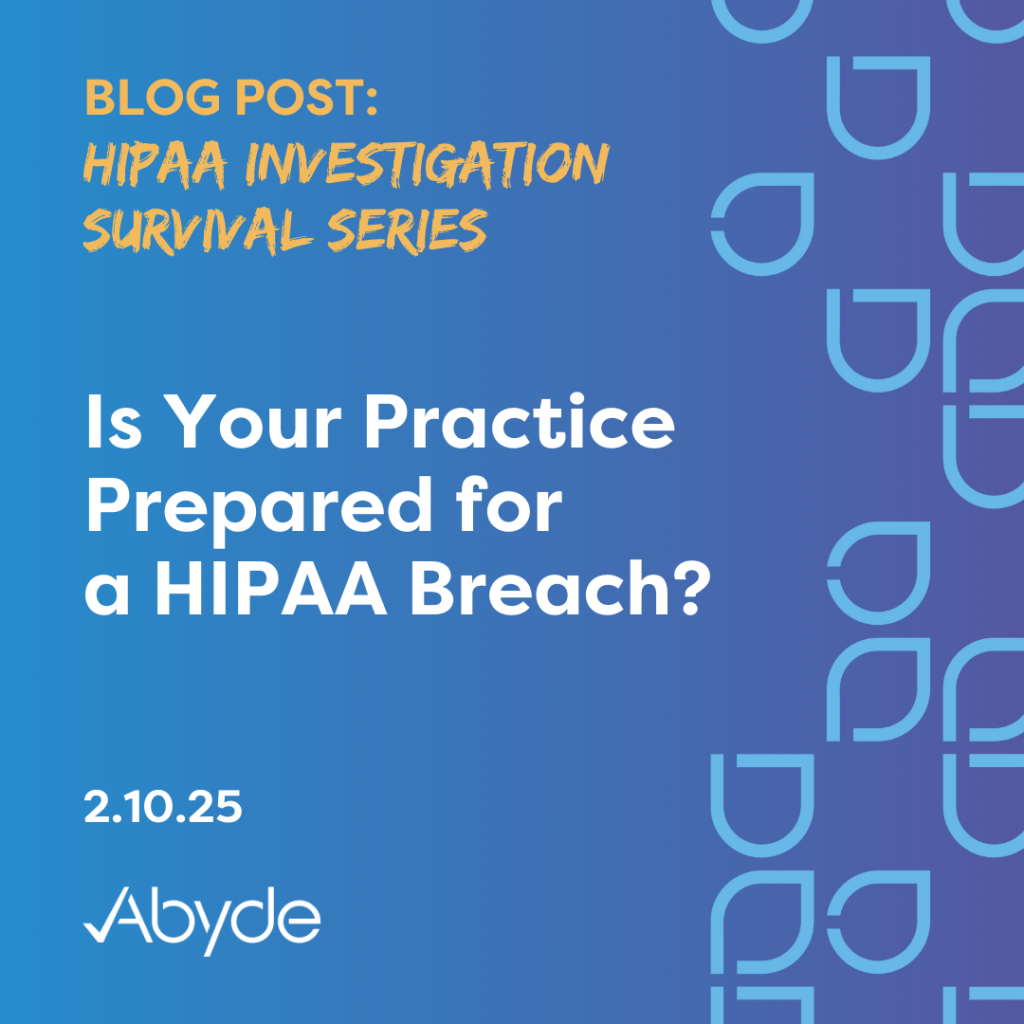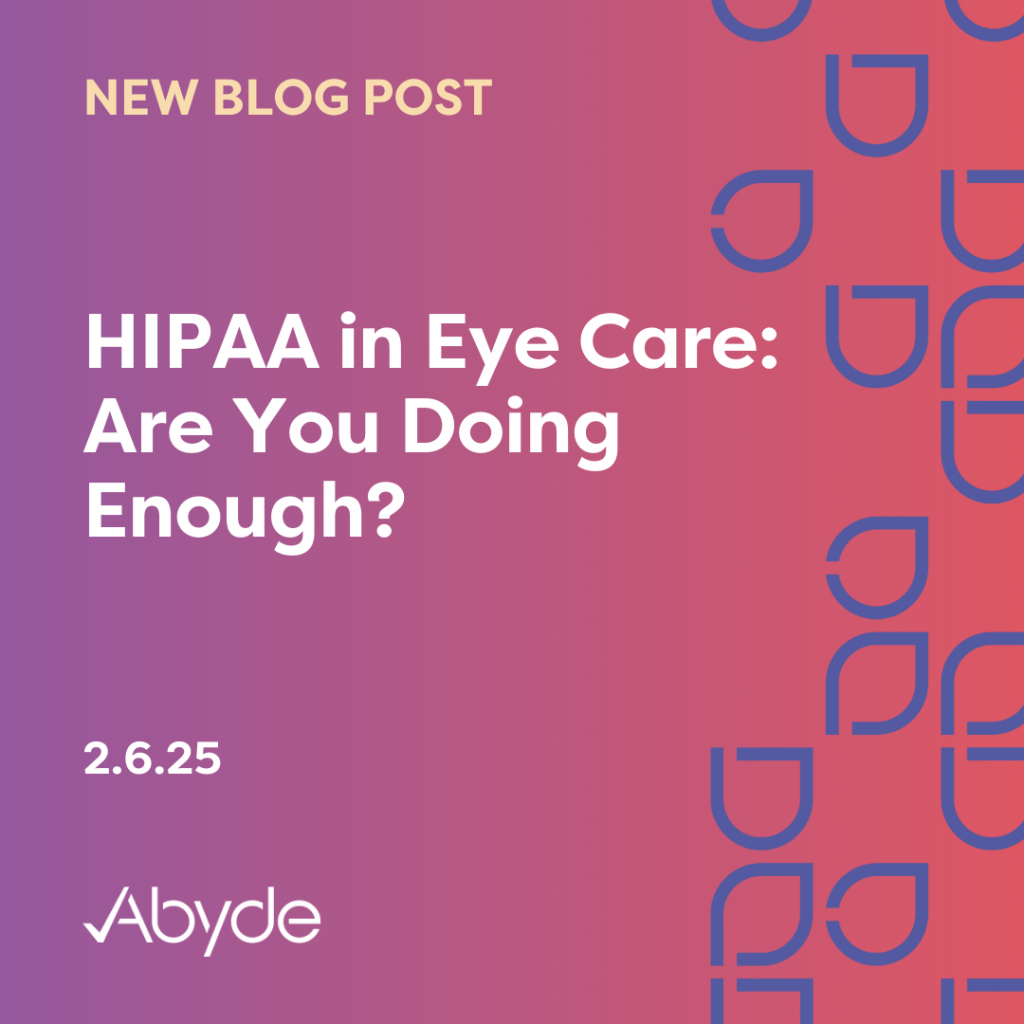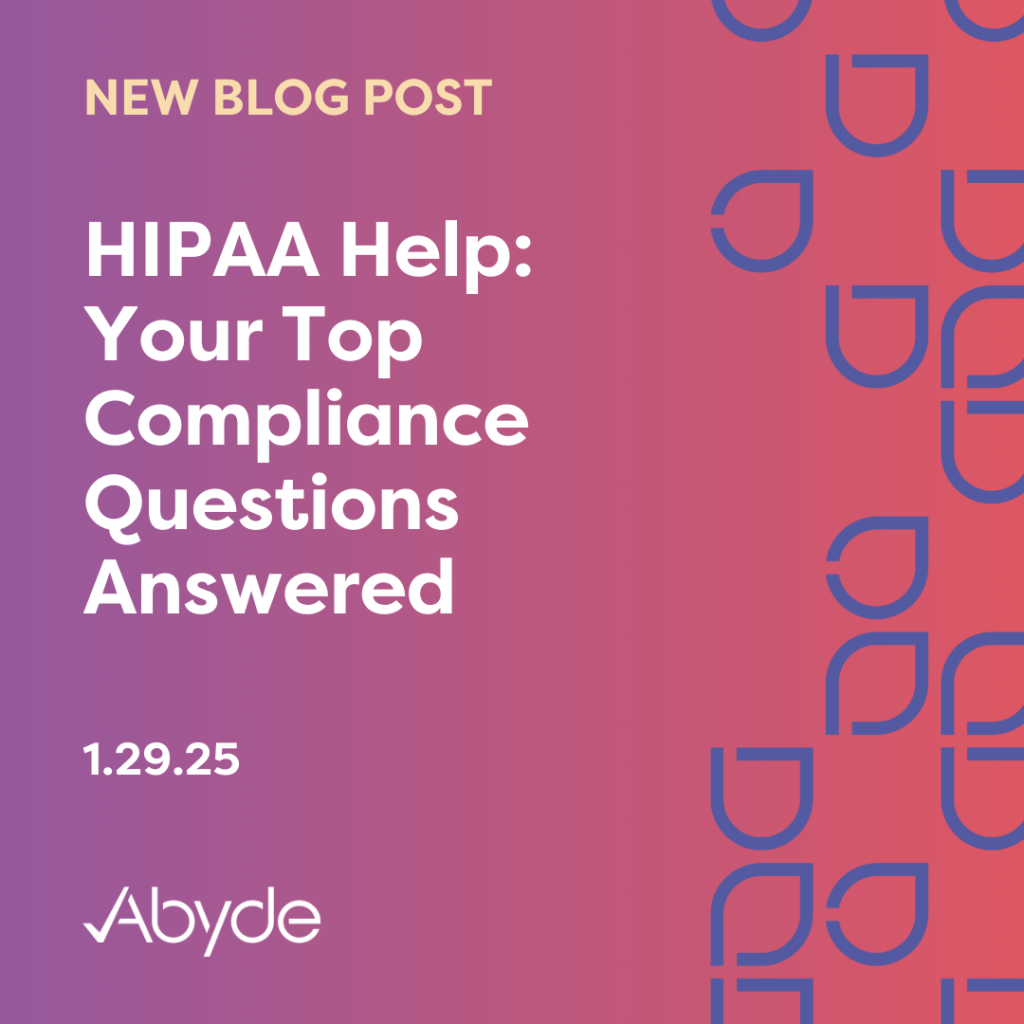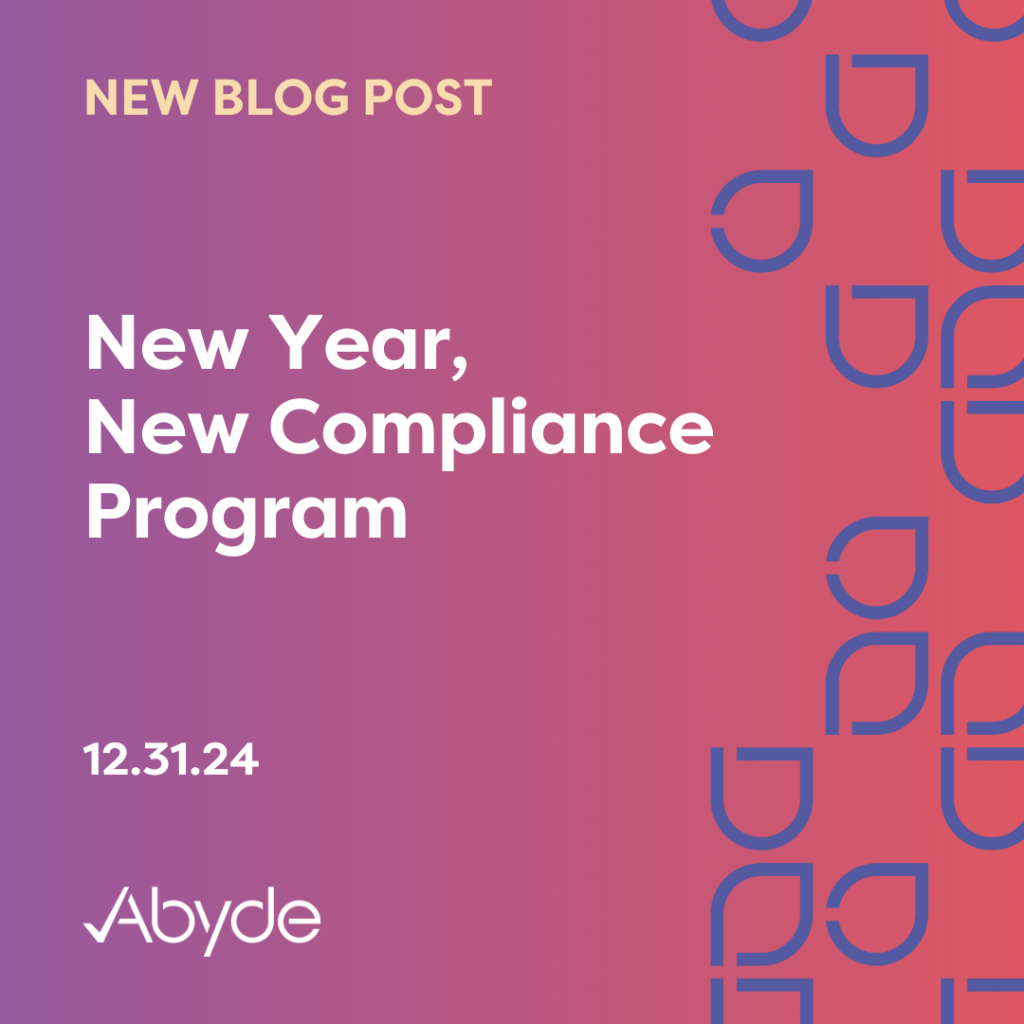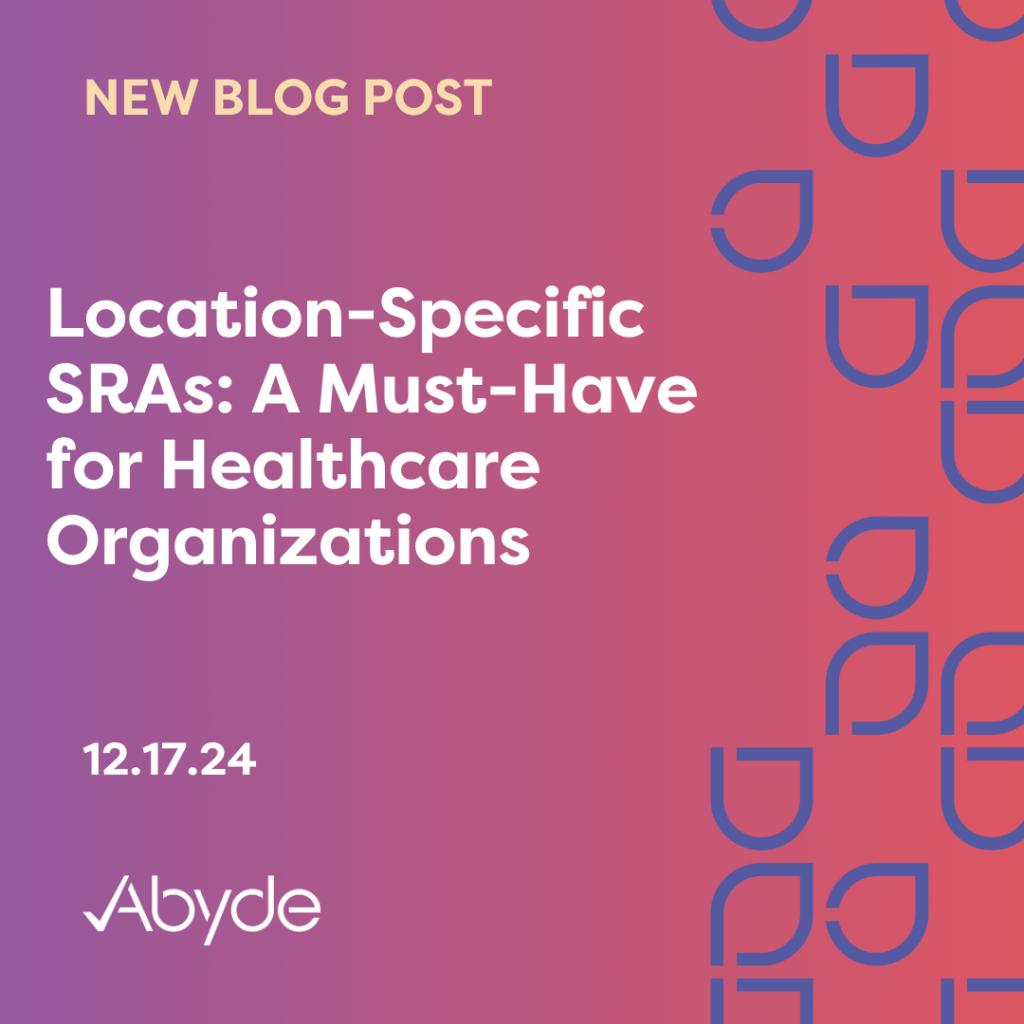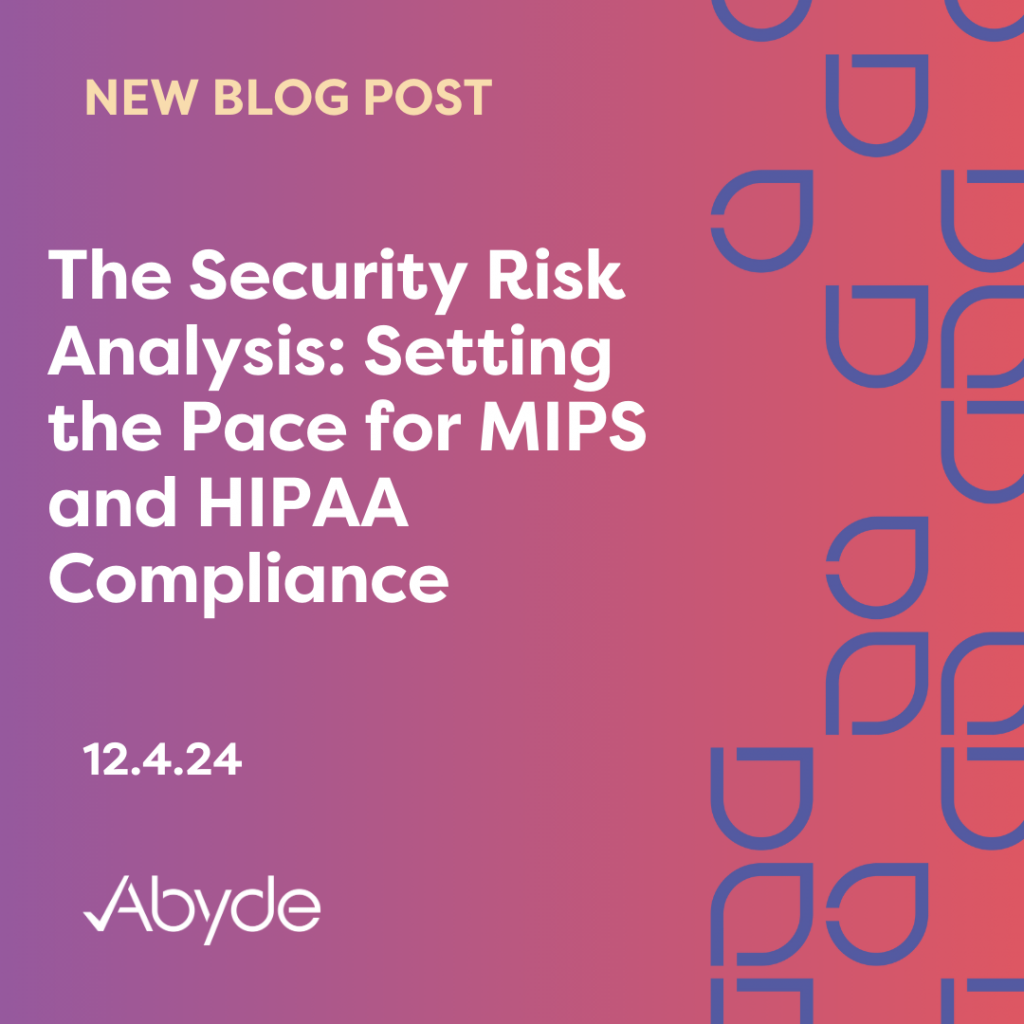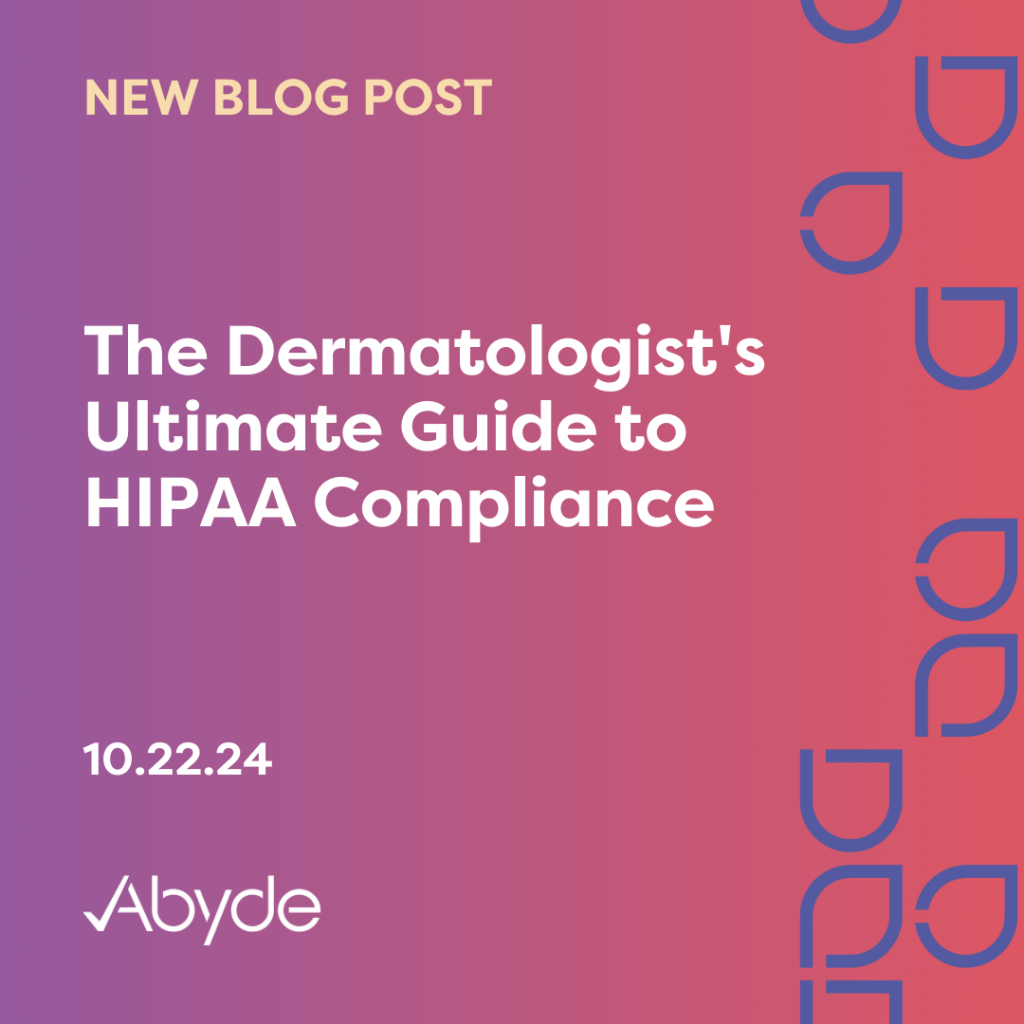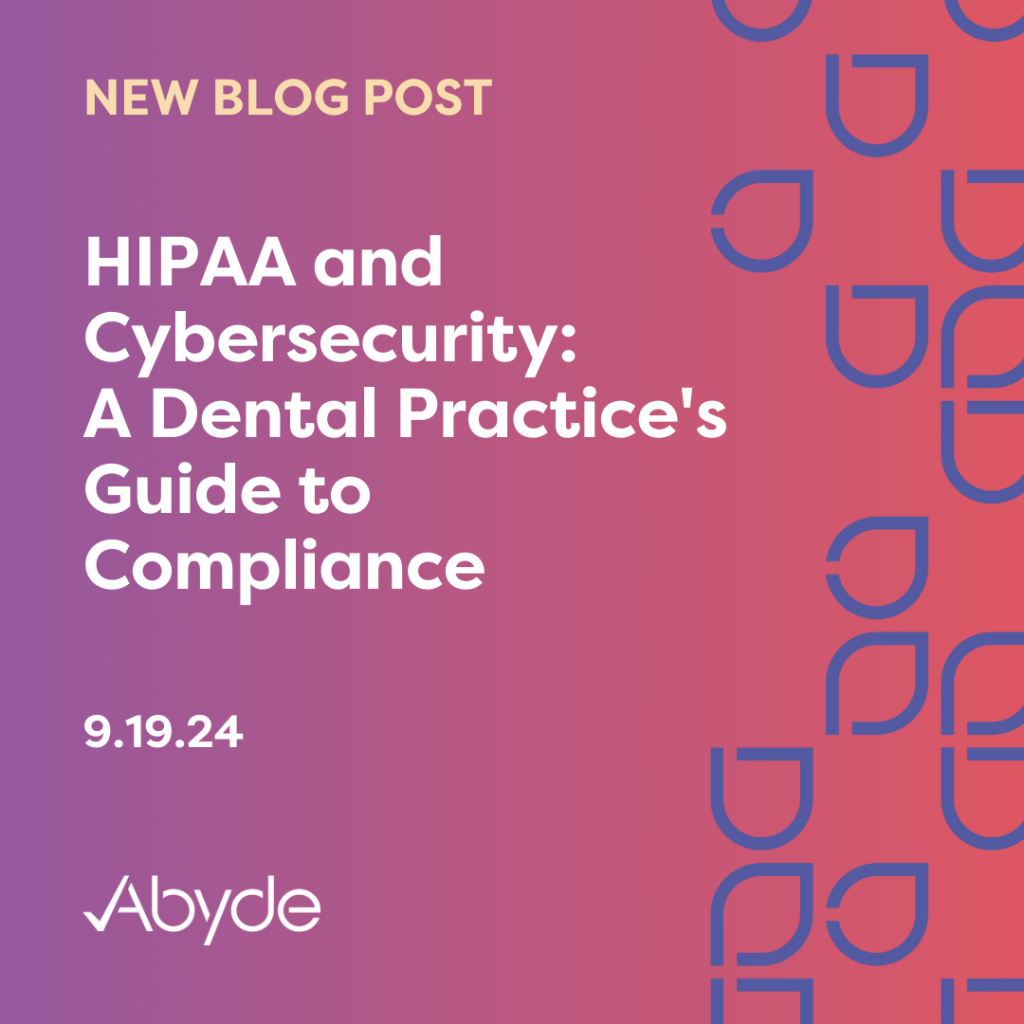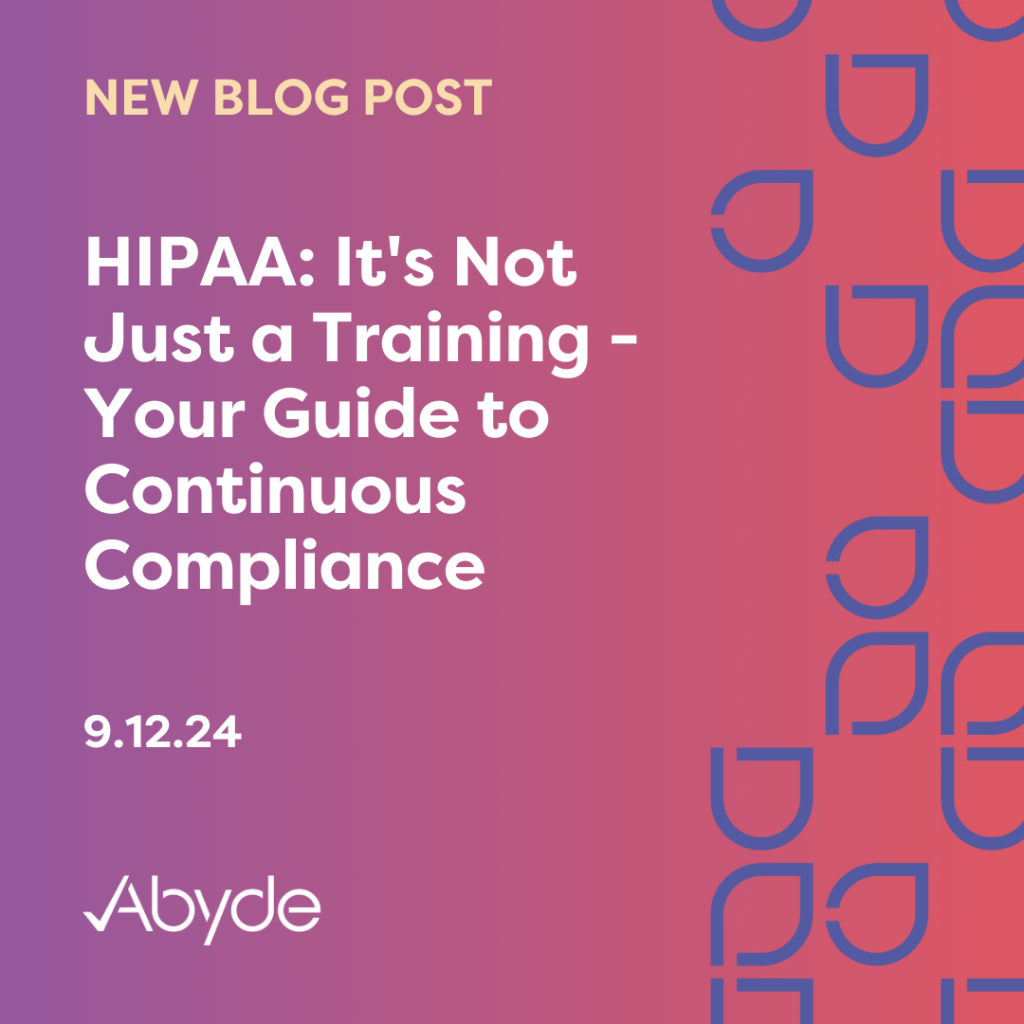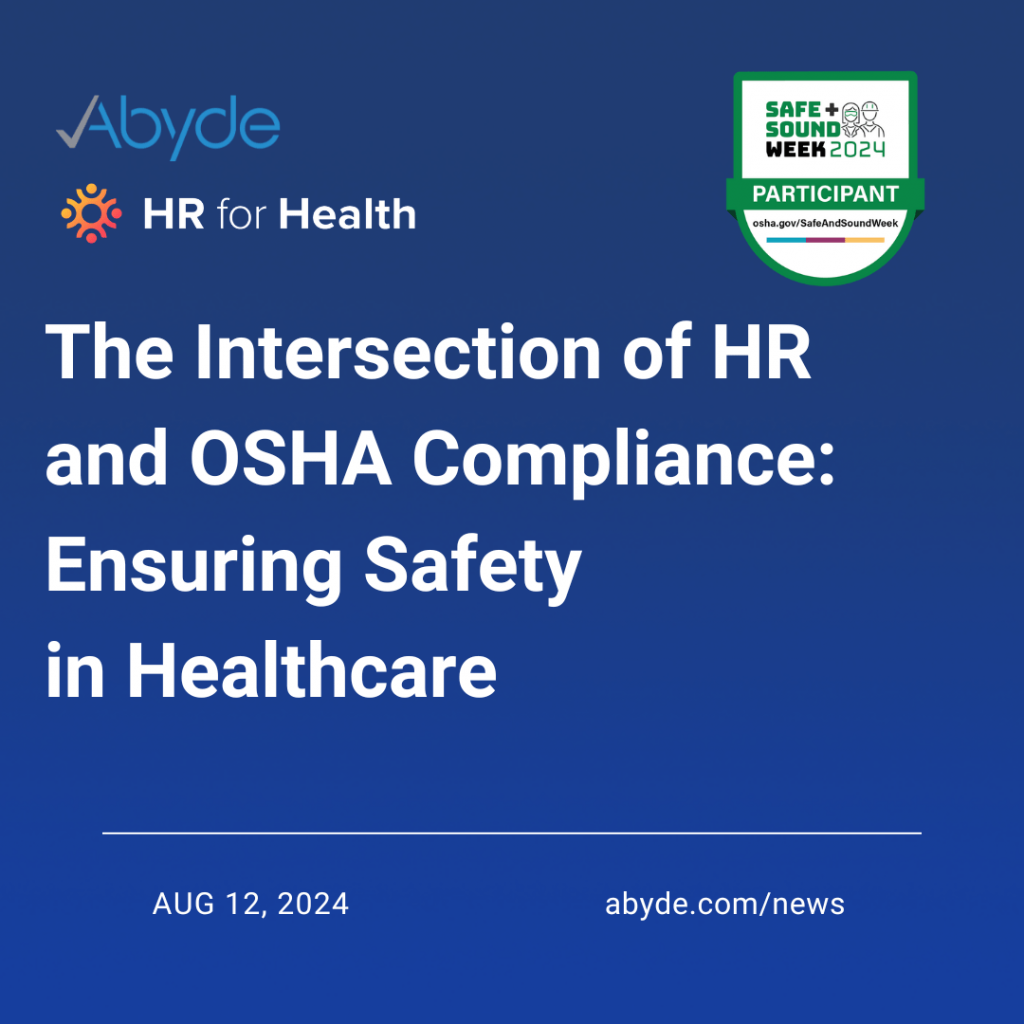February 10, 2025 Welcome to Abyde’s HIPAA Investigation Survival Series. HIPAA investigations can last for years, making it one of the most stressful experiences a practice can endure. It’s vital your practice understands the investigation process. The first step of the HIPAA investigation is the breach itself. Experiencing a data breach is pretty common in healthcare and can affect organizations of all sizes. For example, the Change Healthcare breach, a subsidiary of UnitedHealthcare, exposed at least 100 million patients’ data. While they might be common, it’s still your practice’s responsibility that the proper precautions are put in place to mitigate risks. What is a Breach? A breach is any impermissible disclosure of Protected Health Information (PHI) without authorization. PHI is data that can individually identify a patient, including information like Social Security numbers, birth dates, medical records, and more. Healthcare faces significant data breaches due to various threats, including stolen computers and unauthorized access. However, the largest threat by far comes from ransomware and cybercrimes. Ransomware reports to the Office for Civil Rights have increased 264% in the last five years. Ransomware can infect systems through several channels, like email. Successful phishing attempts are the most common way malicious actors hack healthcare systems. That’s why it’s imperative to provide proactive training to staff, ensuring they are aware of common phishing scams and how to handle spam emails when they arrive, such as forwarding them to IT or immediately sending them to spam. If my practice is breached, what do I do? If your practice is breached, handling the situation calmly is important. Time is of the essence when it comes to HIPAA breaches, with every second pivotal for a hacker to leak more information. When becoming aware of a HIPAA breach, your practice must take the infected device offline and review the scope of the hack. In situations like these, Based on the size of your organization, it’s important to have an in-house or outsourced IT team to navigate you through the technical process. A breach report needs to be filed as well. This can depend on the size of the breach, with breaches impacting less than 500 needing to be filed within 60 days from the end of the year and large breaches, or 500+, needing to be reported to the OCR within 60 days of discovering the breach. This report needs to be filed here. The state where a breach occurs is a crucial factor, as some states have stricter requirements, including shorter timelines. In either situation, affected patients need to be notified. Under the Breach Notification Rule, patients must be notified within 60 days of discovering the breach. For large breaches, media notice is required, usually in the form of a press release, to ensure impacted patients are aware their health information was put at risk. Once again, depending on the state, different parties, like the State Attorney, need to be notified. What’s Next? The OCR may investigate your practice to ensure you had the proper protocols in place before and if the response after a breach is sufficient. This investigation would take place after breach recovery efforts are completed, such as restoring systems and notifying the necessary parties. A common misconception is a HIPAA fine is due to a cyber attack. Sometimes, breaches occur no matter how many safeguards you have in place. Fines are levied on practices that did not take the proper precautions before an event, such as training staff, having antivirus software, or having a Security Risk Analysis (SRA) in place. The fine is not due to the breach itself, but it triggers an investigation, where fines can be levied for lack of preventative measures. During an investigation, the government looks to see that your practice has taken steps to mitigate and prevent cybersecurity issues before they escalate into a breach. That’s why it’s imperative to implement protective measures for your practice before a breach occurs. Getting compliant can be overwhelming, but with the right tools, you can easily streamline your HIPAA program. Smart software solutions can serve as a comprehensive compliance hub, allowing you to see your practice’s vulnerabilities and offer steps to fix them. To learn more about HIPAA compliance for your practice, meet with a compliance expert today. Read the second installment of the series, focused on the HIPAA Investigation letter here. Read the third installment of the series, focused on organizing documentation for a HIPAA Investigation here. Finish the series here to learn about the potential outcomes of a HIPAA investigation.
HIPAA in Eye Care: Are You Doing Enough?
February 6, 2025 Running your eye care practice presents a unique set of challenges. From patient care to handling intricate technology, the workload can be demanding. Even though working in eye care keeps you busy, HIPAA compliance must be maintained. While taking care of your patients’ vision is your first priority, their data health is also important. HIPAA, or the Health Insurance Portability & Accountability Act, is a federal law that defines what Protected Health Information (PHI) is and what your eye care practice needs to do when ensuring data security. The Office for Civil Rights enforces HIPAA compliance and has levied monetary fines and other penalties against eye care practices. In fact, an eye care center was fined $250,000 last year after a major ransomware attack revealed its inadequate compliance practices. When getting your compliance program in order, knowing where to start is vital. How Can I Achieve HIPAA Compliance for My Eye Care Practice? HIPAA consists of several major rules and regulations, including the Security Rule, the Privacy Rule, and the Breach Notification Rule. The Security Rule focuses on the administrative, technical, and physical safeguards a practice needs to deploy to secure patient data. Some common precautions examples include antivirus software, door alarms, and employee ID badges. A significant component of the Security Rule is the Security Risk Analysis (SRA). The SRA is a comprehensive assessment of your eye care practice’s current efforts to protect patient data. This analysis is the foundation of a compliant practice and allows your practice to identify and address vulnerabilities. The OCR has also increased enforcement surrounding missing this document with the Risk Analysis Initiative. This rule, as of January 2025, is currently being updated. The proposed Security Rule updates are focused on modernizing the legislation, requiring more safeguards to protect patient data. For an in-depth analysis of the updates, please read here. The Privacy Rule focuses on limiting how patient data is shared. One part of this rule is the Minimum Necessary Standard, which requires practices to share only the necessary amount of information when handling PHI. Another component of the Privacy Rule is the Right of Access standard. This requires practices to give patients access to their medical records within 30 days. In some states, this timeline is even shorter. Lastly, the Breach Notification Rule dictates how affected patients and the OCR need to be notified after a breach. How a breach is handled can vary depending on the severity of the incident. The OCR must be notified of breaches affecting fewer than 500 people within 60 days of the end of the year. Breaches affecting 500 or more patients must be reported within 60 days of the incident. Affected individuals must be notified within 60 days. Depending on the state, some of these timelines may be shorter, and the state attorney may also need to be notified. These announcements are usually sent out as press releases and provide credit monitoring and more to impacted patients. What’s Next? While HIPAA compliance might feel overwhelming, there are ways to streamline compliance. Utilizing smart software solutions can alleviate the stress of compliance, allowing your practice to focus on providing quality eye care. To learn more about how you can streamline HIPAA compliance in your eye care practice, schedule a consultation with one of our experts today. x
HIPAA Help: Your Top Compliance Questions Answered
January 29, 2025 Managing HIPAA compliance for your practice can be challenging. Given the overwhelming number of laws, requirements, and procedures to navigate, you likely have questions about ensuring compliance. Other practices likely have the same questions as yours. Learn more about the most common questions healthcare practices have and how you can ensure compliance. Who Needs to Do HIPAA Training? One of the most important HIPAA requirements is making sure staff members complete training. When facing a HIPAA investigation or audit, the Office for Civil Rights (OCR) will ask for documentation proving your practice has been properly trained. However, many questions might arise around this, including: How often should staff members train? How long should I keep training records? Who in my practice has to complete HIPAA training? First, HIPAA training is required for all staff that have access to Protected Health Information (PHI). PHI includes information like names, Social Security numbers, medical records, and more. Staff with access to sensitive data need to understand the foundation of HIPAA and how thorough data management protects patients. As staff members learn about vital skills such as breach management, compliant patient communication, and handling sensitive information, they become better equipped to manage PHI. Documentation of this training is required for each individual, such as each staff member receiving a completion certificate. This completion certification, or whatever proof that training has been completed, must be saved for at least six years. When being investigated, the OCR can and will ask for multiple years of training proof, so ensure your training program documentation is properly organized. This training needs to be completed at least annually, and it is recommended that new staff be trained as soon as possible before handling PHI. Staff should also be retrained should a breach occur, refreshing staff on proper procedures. What is a Business Associate Agreement? When entrusted with PHI, it is crucial that any third-party vendors working with your practice implement appropriate safeguards to protect sensitive data. This is where a Business Associate Agreement (BAA) comes in. The BAA is a document that holds both parties responsible for the protection of PHI. This document includes what PHI is defined as and how both parties have to uphold its protection. HIPAA requires this document to be signed by any Business Associate (BA) with access to PHI. Some common examples of BAs include shredding companies, billing companies, and more. If your BA doesn’t want to sign this agreement, that’s a bad sign, and it’s recommended that your practice works with another vendor. The OCR also recently proposed strengthened requirements for BAs. This would require businesses work with a cybersecurity expert to prove adequate safeguards for patient data are in place. What Should I Do with Patient Consent Forms? The HIPAA Authorization for Use or Disclosure of Health Information Patient Consent Form must be provided to the patient before you can work with them. Consent forms allow patients to understand and authorize how their health information is shared. This includes granting access to specific individuals. Patients can decline to sign this form and still be treated by the practice, but it must be noted in their records. It is also always best practice to review these consent forms with patients every three years, ensuring that the information is still current. What’s Next? From staff training and business associate agreements to patient consent forms, staying HIPAA compliant requires attention to detail. Smart software solutions with expert teams and simplified compliance can help alleviate this burden and allow you to easily check your compliance status. HIPAA compliance may seem daunting, but by taking these steps and utilizing the right tools, you can protect your practice and your patients. Ready to learn more? Watch our latest webinar, which addresses even more of the top questions healthcare professionals have when it comes to healthcare compliance.
New Year, New Compliance Program
December 31, 2024 After a year of record-breaking breaches and fines in 2024, starting the new year with your HIPAA compliance buttoned up is crucial. A compliance program is a comprehensive plan to ensure compliance with HIPAA guidelines. It’s much more than yearly training; it’s what you do daily to uphold your commitment to patient data safety. The new year is about implementing new routines and actions for improvement. That’s why now is the time to get the right compliance program in place. Here are three key goals to help you start on the right track in 2025. Complete a Security Risk Analysis The first step to HIPAA compliance is completing a Security Risk Analysis (SRA). The SRA is an assessment of the administrative, technical, and physical safeguards your practice has in place to protect patient data. While the SRA might seem like a simple requirement to adhere to HIPAA regulations, it is actually one of the most overlooked, with only 14% of practices able to present documentation of a compliant SRA. The SRA helps your practice identify vulnerabilities and creates a roadmap for HIPAA compliance, guiding your practice on what needs to be addressed. This documented analysis of your practice is the foundation of a compliant practice. Establish a Culture of Compliance A culture of compliance is the understanding that everyone—from leadership to staff—recognizes the importance of protecting patient data. To achieve a compliant practice, it’s vital that all staff understand and continuously commit to following HIPAA. The culture of compliance involves much more than just training; it encompasses every decision employees make when dealing with data. This includes using the appropriate encryption measures when sending emails to patients and ensuring that staff members discuss only the minimum necessary amount of Protected Health Information (PHI) when required. To cultivate a culture of compliance in your practice, staff must have access to comprehensive resources to train, learn, and document anything regarding PHI. This could include interactive training portals, required access logs, and easy access to all learning materials. By providing streamlined compliance, your practice not only establishes a culture of compliance but also enforces it, holding all staff accountable if they don’t adhere to HIPAA guidelines. Get Organized – Digitize Documentation In the new year, do a self-audit of your HIPAA documentation. If asked, could you easily find specific policies? While meeting HIPAA requirements is essential for a compliant practice, you must also be able to present documentation as proof. The year is about embracing change. While most might picture their HIPAA manual as an overflowing binder, this is not the only option for managing documentation. It’s time for a change. Cloud-based compliance programs allow you to access your HIPAA manual easily by logging into your account. Gone are the days of rifling through a binder to find a specific policy or procedure—a web-based HIPAA manual easily generates and organizes your documentation, saving you time and keeping all versions of your documentation in a centralized location. Sticking to Resolutions If achieving streamlined HIPAA compliance has been a long-avoided New Year’s Resolution, this is the year to begin. With the right program, you can simplify compliance and have complete visibility into what is necessary to remain compliant. To learn more about how to get compliant this new year, schedule a consultation with a compliance expert today.
Location-Specific SRAs: A Must-Have for Healthcare Organizations
December 17, 2024 Keeping all locations in line with HIPAA regulations can be quite a challenge, especially when managing a multi-location practice. It’s a complex puzzle that requires careful attention to detail and a proactive approach to ensure compliance across the board. And we hate to break it to you, but a blanket Security Risk Analysis for your organization isn’t enough. A Security Risk Analysis, or SRA, is a thorough review of your organization’s physical, administrative, and technical safeguards to protect patient data. Even when you’re managing compliance at a single location within a multi-location organization, you are responsible for ensuring an SRA is completed for your location. The Office for Civil Rights (OCR) is serious about this requirement, as indicated by a recent significant fine. A penalty of over $500,000 was recently announced for the Children’s Hospital of Colorado system. While this investigation was sparked by a phishing attack, one of the major findings was missing SRAs for all locations. Completing this SRA is imperative. As the OCR spearheads new enforcement and initiatives, it’s time to get compliant. What is a SRA? The SRA is an in-depth review of everything your practice does to ensure patient data is safe. This means everything from whether your practice utilizes alarms and codes on doors to the servers you use and even how your staff handles patient intake, like how the sign-in sheet process works. The SRA is the first step of a compliant practice because it allows you to review your vulnerabilities and make changes to uphold your commitment to keeping data safe. The SRA is also a requirement for MIPS. Unfortunately, the SRA is a commonly missed requirement for medical practices. In fact, 86% of all practices could not show an adequate SRA in the last round of random HIPAA audits. Completing a sufficient Security Risk Assessment (SRA) is essential for maintaining a compliant medical practice. This process is closely linked to the Office for Civil Rights (OCR) Risk Analysis Initiative, which mandates that medical practices and organizations carry out this required assessment. Recently, the Bryan County Ambulance Authority was fined $90,000 for failing to conduct an SRA, marking the first enforcement action under this new initiative. This incident demonstrates the OCR’s commitment to this initiative and its dedication of resources to ensure compliance. Importance of Location-Specific SRAs When conducting a SRA, assessing every location within your organization is vital. While performing a single SRA for the entire entity might seem easier, compliance is more intricate and requires ongoing attention rather than being a one-off endeavor. Each location has distinct vulnerabilities that must be acknowledged and addressed. For instance, one location might have different vendors than another, and another location might be in an older building, with different security to keep Protected Health Information (PHI) safe. Although some overarching requirements may come from the main location, capturing each site’s specific conditions is essential. This thorough documentation demonstrates that every location takes compliance seriously, addresses vulnerabilities, and keeps patient data safe. How to Complete an SRA With the right resources, managing and completing an SRA for a multi-location practice can be simplified. Organization is key: ensuring each location completes all SRAs and can be easily accessed in a centralized location. Your organization can efficiently complete this requirement by having a tailored set of questions for each location. To learn more about streamlining your multi-location SRAs for your organization, schedule a consultation with a HIPAA expert today.
The Security Risk Analysis: Setting the Pace for MIPS and HIPAA Compliance
December 4, 2024 As a healthcare provider, tackling your daily to-do list probably feels like running a marathon without a finish line at times. You’re tasked with managing a successful business, keeping up with ever-changing legislation and new technology while ensuring that your top priority of patient care never falls behind. Despite the challenging course, there’s a benefit to keeping pace with both quantity and quality. Providers are rewarded for going the extra mile thanks to Value-Based payment programs like MIPS and other government incentives like the HIPAA Safe Harbor Law. What is MIPS? You’ve most likely heard of the Merit-based Incentive Payment System (MIPS) and might already be a participant in it. Whether it’s a Quality Payment Program or new legislation passed into law, the government continually emphasizes the importance of being proactive rather than reactive and providing incentives for doing so. This is why it’s valuable to know whether your organization is eligible to participate in government programs (you can check here). Many of these different program requirements align with the standards your practice already has to meet under HIPAA law—protecting your patients, checking off compliance requirements, and receiving incentives can often be done all in one stride. To take a quick step back, MIPS is one of two payment tracks under the Medicare Quality Payment Program. The Centers for Medicare and Medicaid Services (CMS) uses this system to measure eligible clinician performance and reward high-value, low-cost care. MIPS participants can receive a payment adjustment to their Medicare reimbursements based on their performance scores across four different categories: Quality: The type of care you deliver based on specific measures of performance. Promoting Interoperability: Focuses on patient engagement and electronic exchange of information using Electronic Health Record (EHR) technology to improve patient access to their health information and exchange of information between providers. Improvement Activities: Your participation in clinical activities that work towards improving care coordination and patient engagement and safety. Cost: Assesses the cost of care you provide in relation to your Medicare claims. The Importance of the Security Risk Analysis (SRA) Before you can engage with the various performance measures, you must first meet a prerequisite for participating in the MIPS Promoting Interoperability performance category. This requirement is crucial not only for achieving HIPAA compliance but also for benefiting from other government incentives: the Security Risk Analysis (SRA). Conducting an SRA involves evaluating any potential risks to your organization’s electronic Protected Health Information (ePHI) and implementing necessary security updates and safeguards to address any identified vulnerabilities. Your organization must complete an SRA at least once a year to comply with MIPS and HIPAA standards. Additionally, it’s important to review and update the assessment regularly throughout the year to reflect any changes in your processes. Getting Compliant for MIPS Beginning your compliance journey can be overwhelming, but it is essential to take advantage of government initiatives such as MIPS. Intelligent software solutions can help keep your practice on track by outlining the requirements for HIPAA compliance and offering a streamlined SRA that meets MIPS standards. To learn more about how to become compliant for MIPS, schedule a meeting with a compliance expert today.
The Dermatologist’s Ultimate Guide to HIPAA Compliance
October 22, 2024 Did you know that a dermatology center was fined over $300,000 for violating HIPAA? HIPAA compliance is not always top of mind when managing your dermatology practice. Administrative tasks can easily take a back seat with a focus on diagnosing and treating skin conditions. Nevertheless, it’s crucial to prioritize HIPAA compliance. Discover what steps you need to take to ensure the safety of your dermatology practice. What’s Protected Health Information? Protected Health Information (PHI) is sensitive data that can personally identify a patient. Examples of PHI include a social security number, birth date, medical records, and even images of skin ailments for dermatologists. These images can contain personally identifiable information, such as tattoos and unique birthmarks. When working with patients, it’s crucial to ensure all images and other forms of PHI are encrypted and protected behind essential safeguards to secure patient information. Social Media 101s When sharing images of your patient’s treatment, such as before-and-after images of acne treatment, it’s important to do so compliantly. While you might think you’re sharing a feel-good story, patient images are considered Protected Health Information (PHI), and sharing them without consent could violate their privacy. You need the patient’s signed media consent form to share these images and patient reviews on social media compliantly. This form ensures that the patient understands and agrees to use their image and treatment details being shared with the public. Improper Disposal The largest dermatology HIPAA fines, totaling over $300,000, were imposed due to improper disposal. Some states have even stricter laws regarding discarding old patient files, which must be retained for at least six years on a federal level. These files also need to be encrypted throughout the creation to disposal process. When getting rid of sensitive information, ensure it is shredded and properly disposed of. Partner with a disposal company specializing in medical paperwork and waste and have a Business Associate Agreement in place. How Software Solutions Can Help Dermatology helps patients feel comfortable in their own skin, both literally and figuratively. Implementing the appropriate safeguards to protect patients’ data is just as important. By utilizing smart software, you can see where your dermatology practice stands and what you need to do to be compliant. To learn how you can protect your dermatology practice, schedule a consultation with an expert.
HIPAA and Cybersecurity: A Dental Practice’s Guide to Compliance
September 19, 2024 Did you know that medical information is one of the most valuable pieces of information for hackers to obtain? A health record sells for ten times the amount compared to a credit card on the dark web. In today’s digital world, technology has brought significant advancements to how dental practices operate, from communicating with patients to reviewing dental records. However, it has also introduced new challenges related to practice safety. Implementing strong cybersecurity measures is crucial for protecting your patients. Let’s dive into how to safeguard your practice and keep your patients safe in today’s cyber world. Complete a Security Risk Analysis (SRA) A requirement under HIPAA, the Security Risk Assessment (SRA) sets a benchmark for your dental practice’s compliance. The SRA highlights risks your practice might face, including technical safeguards and recommended cybersecurity measures. By monitoring the existing measures, you can identify non-compliant gaps and learn best practices to better protect your organization. Establishing a strong foundation for your practice brings you one step closer to HIPAA compliance by showing you how to keep your patient data secure. Establish Access Controls One of the most common HIPAA violations is improper access to electronic Protected Health Information (ePHI). Robust access controls are essential to prevent this. Each staff member should have a unique login with permissions strictly aligned to their job duties. These logins should also require staff to change their passwords periodically, including at least eight characters with symbols, numbers, and lowercase and uppercase letters. This safeguards sensitive patient data and facilitates effective monitoring for potential security breaches. Additionally, monitoring employee activity helps ensure access privileges are used appropriately. Encrypt all ePHI Encryption, or encoding data so that it is unreadable by unauthorized users, is a staple of having strong cybersecurity measures in place for your practice. It should be used on all devices storing sensitive data and facilitating patient communication, ensuring that only authorized individuals can access it. Encrypted data and devices can protect sensitive information if a work laptop falls into the wrong hands. Another cybersecurity best practice is to enable remote deletion on the computer so that it can be wiped from another functioning device. Overall, encryption serves as an additional barrier to protecting patient data and keeping sensitive information secure in dental practices. Ensure Adequate Cybersecurity Training for All Staff It is crucial to ensure that staff understand expectations and cybersecurity best practices to keep patient data safe. Training is important to help staff understand how to handle sensitive information and how to share ePHI (electronic protected health information) securely. Thorough training will empower staff to maintain the security of patient data and uphold the best cybersecurity practices, helping create a culture of compliance in your practice. Outsource IT Automating your HIPAA compliance program with secure software helps protect your practice and streamline compliance. Additionally, outsourcing your IT measures is another responsibility your organization can delegate to an expert team. Expert teams can monitor your cybersecurity health and provide penetration testing, emulating whether your practice can handle a hacking attack. With specialized healthcare IT support, your practice can rest assured that the proper firewalls, encryption, and other protections are in place to safeguard it. The Future of Cybersecurity in Dentistry Robust cybersecurity measures are essential in today’s dental industry. The OCR continues to lead cybersecurity efforts and is starting to impose fines on practices affected by cybercrimes. By ensuring that your dental practice is HIPAA compliant and follows cybersecurity best practices, you can protect your practice’s success and the safety of your patients’ information. To learn more about the best cybersecurity practices for your dental practice, schedule a HIPAA consultation with a compliance expert today.
HIPAA: It’s Not Just a Training – Your Guide to Continuous Compliance
September 12, 2024 Picture this: it’s time for your annual HIPAA training. Once you complete all the staff training, you’ll be compliant for the year, right? You would actually be mistaken, but that’s okay. It’s a common misunderstanding of HIPAA and its requirements. HIPAA is comprehensive federal legislation that protects sensitive patient data. As a staff member of a Covered Entity or Business Associate, it is your responsibility to ensure the proper safeguarding of patient data, which requires much more than annual training. This article examines the requirements for HIPAA compliance and showcases how software solutions can more thoroughly and quickly ensure responsibilities are met compared to manual tracking. So, what’s required for HIPAA? HIPAA compliance requires a continuous documented program, not just annual training. When HIPAA is followed correctly, appointing a HIPAA Compliance Officer (HCO) is essential. This highlights the need for leadership and organization of all elements to ensure compliance. One of the most essential components of HIPAA is a Security Risk Analysis, or SRA. The SRA is a commonly missed requirement, with 86% of Covered Entities and BAs unable to present the documentation when randomly audited. The SRA is a detailed review of all the safeguards your practice has in place to protect patient data. This ranges from alarms on doors to procedures followed by your staff, and it is a thorough analysis of your practice’s precautions and vulnerabilities regarding HIPAA. Alongside a documented SRA, policies and procedures must be made available to all staff, empowering employees to quickly review the best course of action if an issue arises. Using templates you find online will not cut it if they are not personalized and unique for the location. Documentation is a significant component of HIPAA. Another required paperwork element of HIPAA is Business Associate Agreements with all third-party companies your practice or business works with that have access to PHI (Protected Health Information). When HIPAA breaches occur, they also have to be documented and reported. As you can see, HIPAA compliance is much more than just training. It’s a continuous program for a good reason: protecting patients’ sensitive health information. The Future of HIPAA Compliance HIPAA Compliance is a continuous process; one yearly training isn’t going to cut it. The requirements of HIPAA can be complex, but with intelligent software solutions, your organization can streamline compliance and mitigate risk. Utilizing comprehensive software solutions can help identify your vulnerabilities, save your practice significant time, and offer a clear understanding of what needs to be done to ensure compliance. Instead of relying on a cumbersome manual binder full of paperwork, innovative solutions can offer these advantages. To learn more about HIPAA compliance best practices, schedule an education consultation with one of our experts today.
The Intersection of HR and OSHA Compliance: Ensuring Safety in Healthcare
August 12, 2024 This was contributed by HR for Health for OSHA’s Safe + Sound Week At HR for Health, OSHA compliance is a frequent and critical topic of discussion with our clients. As an HR company focused on supporting independent healthcare practices, we understand the importance of taking compliance, training, documentation, and safety seriously. Whether your practice is large or small, adhering to OSHA standards is not just about following the rules—it’s about protecting your employees and fostering a safe work environment that benefits everyone. Compliance laws can seem overwhelming, but it’s a non-negotiable part of running a healthcare practice. Non-compliance can lead to significant penalties, not to mention the time-consuming and expensive lawsuits that could arise if an employee or patient is injured. Beyond the financial implications, a commitment to safety and compliance contributes to a healthier, more productive workplace. But how do you ensure your practice stays compliant without getting bogged down in administrative tasks? That’s where HR for Health and Abyde come in. Together, we provide a comprehensive solution that simplifies the complex worlds of OSHA and employment law compliance, making it manageable for practices of all sizes. Why OSHA Compliance Matters OSHA (Occupational Safety and Health Administration) compliance is about more than just avoiding fines. It’s about creating a workplace where your employees feel safe and supported, which in turn leads to better patient care. Compliance involves familiarizing yourself with OSHA regulations, training your employees, and maintaining accurate records of any incidents or hazards. At HR for Health, we see firsthand how often OSHA compliance comes up in our conversations with clients. It’s a constant concern, and rightly so—OSHA compliance isn’t a one-time effort but an ongoing process. That’s why we’ve integrated powerful features into our platform to help you stay compliant effortlessly. Simplifying Compliance with HR for Health Our software is designed to automate and streamline many of the tasks associated with OSHA compliance. For example, our Continued Education automated alerts and updates ensure that your team stays on top of mandatory training and certifications. This feature is crucial because it ensures that your employees are always up-to-date with the latest safety protocols, which helps in maintaining a safe workplace. Documentation is another critical aspect of OSHA compliance. Your practice needs to keep detailed records of any work-related injuries or illnesses, as well as potential hazards. HR for Health offers unlimited e-document storage, so you never have to worry about running out of space or losing important documents. This secure storage solution means that all your compliance-related documents are organized, easily accessible, and safe from loss or damage. But compliance isn’t just about keeping records. It’s also about communication and ensuring that everyone in your practice is on the same page. Our platform includes integrated messaging, task management, and performance reviews, which help facilitate clear communication and make sure that no critical tasks are overlooked. This holistic approach to compliance ensures that your practice runs smoothly and that your employees are always aware of their responsibilities. Partnering with Abyde for a Complete Solution While HR for Health handles many of the HR aspects of compliance, we’ve partnered with Abyde to provide a complete OSHA compliance solution. Abyde’s platform is designed specifically to help healthcare practices navigate the intricacies of OSHA regulations. Their OSHA checklist is an excellent starting point, helping you identify which regulations apply to your practice and what steps you need to take to comply. Abyde also simplifies the training process. OSHA training is essential for ensuring that your employees understand safety protocols and know how to respond in case of an emergency. Abyde’s platform makes this training straightforward for managers and easy for employees to follow, reducing the administrative burden on your practice. Once your employees are trained, Abyde helps you maintain compliance with their tools for documenting safety and health incidents. This includes managing Work-Related Injury & Illness Logs and Sharps Injury Logs, which are critical for demonstrating compliance during an OSHA inspection. Creating a Culture of Safety Compliance isn’t just about avoiding penalties—it’s about creating a culture of safety within your practice. By working with HR for Health and Abyde, you’re taking proactive steps to ensure that your workplace is as safe and efficient as possible. This not only protects your employees and patients but also enhances the overall productivity and morale of your team. OSHA compliance is a vital component of running a successful healthcare practice. By leveraging the combined strengths of HR for Health and Abyde, you can simplify this complex process and focus on what truly matters—caring for your patients and growing your practice. Ready to take your practice’s OSHA compliance to the next level? Visit HR for Health and Abyde to learn how our platforms can help your practice succeed.
